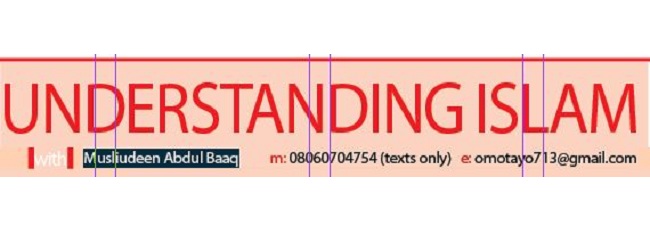

BURYING a deceased Muslim, male or female, according to Islamic tradition, involves specific steps and guidelines.
Washing the body known as Ghusl comes first. The washing starts with the head, then the right side and finally the left side. This process should be repeated three times. Only female attendants should prepare and wash the female body. With Ghusl over, shrouding the body in a white cloth is next. Usually, shrouding comes in three pieces for males and five pieces for females. Additional shroud or wrapper should be used to cover a male hair and body. The essence of shrouding is to ensure that the body is completely covered. This process is known as Kafan. After this, perfume or scented oil should be applied to the body, be it male or female.

The grave should be dug deep enough to prevent animals from reaching the body, with a crevice known as lahd for the body to rest in. The body should be placed on the right side in the grave, facing the Qibla (direction of the Kaaba). The body must be made to align with the Qibla, with the head towards the north and feet towards the south. There should be more layers of soil to be added, starting with a layer, then a layer of small rocks and pebbles, and finally another layer of soil. The grave for the Muslim must be be flat, without any raised mound or erection of any structure.
A deceased Muslim should be buried as soon as possible, ideally within 24 hours, with the Janazah (the funeral prayer) performed before burial. The burial process of a Muslim should be made very simple. Elaborate and expensive burial processes must be avoided. The body should not be preserved with chemicals, and Islam prohibits cremation.
The entire burial process in Islam demonstrates respect and dignity. Muslims should avoid loud noises or unnecessary conversations during the burial process as a mark of respect for the departed, in accordance with the Islamic tradition and values.
However, the following categories of Muslims are allowed to be buried without some or all the burial rites that are traditionally bestowed to a deceased Muslim:
Martyrs known in Islam as Shuhada do not require Ghusl (washing) or Kafan (shrouding). Martyrs are simply buried in the clothes they died in. No Janazah prayer is required as well.
Stillborn and prematurely born babies who did not survive do not require Ghusl and Kafan too. Small graves without coffins are good enough for their burial.
For Muslims who died in a state of Ihram (during Hajj or Umrah), no perfume or scented oil is used during Ghusl and they should be burried in their Ihram garments.
In the case of mass death resulting, for example, from disasters, Islam prescribes simplified and swift burial.
Talking about swift burial of a deceased Muslim, the Prophet (SAW) made sure that all debts incurred by the dead were redeemed effectively before the Janazah.
The Prophet (SAW) would not lead a Janazah prayer over an indebted person until such debts were redeemed. There were many accounts of the Prophet (SAW) paying off debts of his dead followers before the Janazah. Many of them were not his blood relations.
On occasions when the Prophet (SAW) could not afford to pay a deceased’s debt, he encouraged others among his followers to pay off the debt on behalf of the deceased. In the event that no one could volunteer to pay off such debt, then the Prophet (SAW) would excuse himself and take leave, asking the bereaved relatives to bury their dead. This instance illustrates the serious nature of indebtedness for a deceased Muslim.
Hadiths of the Prophet (SAW) provide guidance on deceased Muslims with outstanding debts. On paying off debt from the deceased’s estate, the Prophet (SAW) said, “The soul of the deceased believer is attached to his debt until it is paid off.” (Tirimidhi). This Hadith emphasises the importance of settling debts from the deceased’s estate.
Another narration from ibn Majah says, “If someone dies with debt and leaves no assets, then his debt will be paid by his heirs. If he leaves no heirs, then his debt will be paid by the Muslim community.” This is to highlight the community’s responsibility in supporting the deceased’s family.
The Prophet (SAW) equally encouraged individuals to help settle a deceased’s debts. The Prophet (SAW) said, “Whoever takes on the responsibility of paying off someone’s debt, Allah SWT will reward him with forgiveness and Paradise.” (Tabarani).
Abu Dawud reports that the Prophet (SAW) prioritised debt repayment when he said, “The debt of the deceased should be paid before his heirs receive their inheritance.” He also stresses the importance of settling debts before distributing assets.
And Abu Hurairah (R.A.) quotes the Prophet (SAW) as saying, “When a man dies, his acts come to an end, except for three things: ongoing charity, knowledge that benefits, and a righteous son who prays for him.” Then he added, “and paying off his debt.”
Taking the corpse down to the cemetery after the Janazah must be immediate. Departure for the cemetery has to be immediately after the Janazah prayers, without delay.
Here are the protocols for taking a deceased Muslim to the cemetery after Janazah prayers:
Mourners should walk in front of or beside the lifted coffin, not behind it. The deceased’s body is placed in the grave with the face facing the Qiblah (the direction of the ka’abah in Mecca). The body should be lowered gently into the grave to make sure it does not touch the sides or bottom. The wrapping shroud (Kafan) must be buried with the body, but the wrapping shroud should be loosened around the body. The body should be positioned on the right side, facing the Qiblah. A layer of soil should be added first, then a layer of small rocks or pebbles to prevent soil from touching the coffin. Respect for human dignity must be maintained throughout the burial process, with avoidance of unnecessary conversations.
The burial process is completed with the recitation of relevant supplications such as “Bismillah”and “Innalillahi wa inna ilayhi roji’un,” meaning, “Verily, we belong to Allah, and verily, to Him, we return.”
Here are some prayers that could be recited immediately after the body of a deceased Muslim is interred:
“Allahuma ighfir lihayyina wa mayyitina, wa shaahidina was mayyitina, washaahidina wa ghaibina, wa sagheerina wa kabeerina, wa dhakarina wa unthana. Allahuma man ahyahaytahu minna fa tawaffahu ‘ala al-iman.”
Translation: “O Allah! Forgive our living and our dead, our present and our absent, our young and our old, our male and our female. O Allah! Whoever among us You keep alive, keep them alive with Islam, and whoever among us You take away, take them away with faith.”
Reciting Surah Al-Fatihah, the first chapter of the Qur’an, could equally be rewarding for the deceased.
“Allahuma ajirhu min ‘adhabi al-qabr, wa a’adhuhu bi rahmatika min ‘adhabi al-nar.”
Translation:
“O Allah, protect him from the punishment of the grave, and shield him with Your mercy from the punishment of the Fire.”
These prayers should be recited with sincerity and compassion to seek comfort and peace for the deceased and their loved ones.
Read Also: Sokoto gov, PDP, Tambuwal mourn late district head of Gatawa








